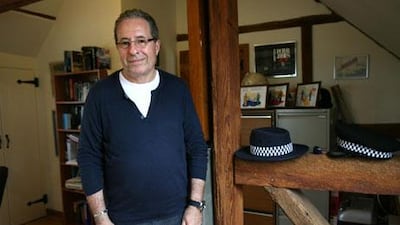The first time The National tries to speak with best-selling crime novelist Peter James, we have to reschedule. James has to go out on patrol with a traffic officer from Sussex Police, so asks if we can bring our meeting forward.
Books: The National Reads
Book reviews, festivals and all things literary
"Who knows what we'll come across," he says excitedly. "It could be a drunk driver, it could be chasing bank robbers." Whatever happens, it's likely to be the inspiration for another instalment in his hugely popular series of novels charting the adventures of Detective Superintendent Roy Grace.
And it's James's commitment to realism that marks him out from the scores of crime-writers whose tales of grizzled policemen fill the shelves of airport bookshops. In many ways, Detective Grace is actually quite ordinary. He appears to be happy, and rather likes his job, for starters.
"The classic fictional cop has a drinking problem and a broken marriage," James says. "And the reality is that no police officer like that would last 24 hours in the service today. So when Macmillan asked me if I had thought about writing a crime series, I immediately wanted to try to write something less clichéd. In Grace's case, that was getting the police work as accurate as possible, having this character who solved puzzles every day as a detective, but had a puzzle of his own that he couldn't solve: his missing wife."
It's interesting that James didn't start out life as a crime writer. In fact, his first book was a spy novel "so terrible I don't allow it in print", and he's written supernatural and science-based thrillers in a long career that has also taken him to Hollywood, producing the likes of 2004's The Merchant of Venice, starring Al Pacino. Perhaps that's why James's new stand-alone book, Perfect People, isn't so much a change in direction as a natural combination of all his interests and experience.
The novel begins by asking the question any prospective parent struggles with: what lengths would you go to to ensure your children were as healthy as possible? In John and Naomi Klaessen's case, blighted as they are by a rogue gene that has already killed their young son, it means they visit a shady offshore geneticist who promises he can literally design a future child so it has a better chance of survival.
Naturally, being a James book, this is the basis for an intriguing thriller as the geneticist proves to be not all he seems. A fanatical religious group surfaces, intent on hunting down the children he has created. There is, slightly hilariously, a set piece at a lonely airstrip in the desert just outside Dubai - simply because James came to the UAE once. But it's the deeply satisfying moral argument running through Perfect People that lends the book its heft.
"Actually, a lot of the books I've written have tackled moral issues," he says. "As a writer I don't want to write books that are just chewing gum for people's eyes. When you read a book, you want to be gripped but also learn something new about the world, have your eyes opened to an issue you hadn't really considered before. So the Roy Grace novels are crime thrillers but based around stories such as organ trafficking and 9/11. And in Perfect People, I passionately wanted to grapple with evolution, but also warn that if you tamper with nature there are all kinds of consequences."
James's real trick is to bolt all the science of genetics on to a ridiculously enjoyable thriller. Without question, his time in film informs his work - chapters are short and punchy, the tension effortlessly cranked up.
"Working in Los Angeles, both in television and film, taught me so much about keeping people's attention," he says. "It's about having something on every page that makes people want to turn to the next one."
Which, in the week that the chairwoman of the Booker Prize, Dame Stella Rimington, (herself a thriller novelist) received so much opprobrium for daring to suggest that books should be read rather than admired, seems like a moot point. As current chairman of the Crime Writers Association, it infuriates James that readable books are somehow seen as second class.
"Where did this myth of literary fiction come from? Was there a difference between Shakespeare's plays and other plays? Of course not. If novels had existed in his time, Macbeth, Lear, Hamlet, Othello and so on would be crime novels. The literary fiction coterie are just breathtakingly arrogant."
Not that James should really care. This week's winner of the Booker, Julian Barnes, has sold 25,000 copies of A Sense of an Ending in the two months since its publication in August. James's latest Roy Grace book, Dead Man's Grip, sold 29,640 copies in its first full week on sale. So why do crime novels continue to enthral?
"Part of the popularity of good crime fiction is that a policeman in the course of a 30-year career sees more human life than any other profession," James says. "Good detectives are incredibly smart people, too. And if you talk to any policeman, they have no idea what they're going to do next - the stories are endless."
And with that, he's off to prepare for his day on the road, waiting for inspiration to strike once again.
- Perfect People (Macmillan) is out on Thursday
Follow us on Twitter and keep up to date with the latest in arts and lifestyle news at twitter.com/LifeNationalUAE

